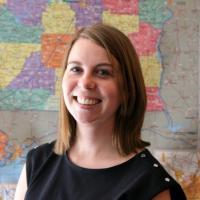By: Jessica Kidd, Associate Director of First-Year Writing and Clinical Professor of English
This is our fifth pedagogy series on Cool@Hoole. Check out previous pedagogy posts from series one, two, three, and four.
 EN 408 is a senior-level creative writing class, and each section of the course has a different focus. My particular section is focused around the theme of “Writer in a Wide World,” and the class has been devoted to exploring different sources of inspiration that help writers expand from their default modes of writing. We’ve visited the Sarah Moody art gallery and scientific collections. We’ve used chance operations, pop culture, articles on scientific discoveries, and ethnopoetics to inform and inspire our writing practice this semester.
EN 408 is a senior-level creative writing class, and each section of the course has a different focus. My particular section is focused around the theme of “Writer in a Wide World,” and the class has been devoted to exploring different sources of inspiration that help writers expand from their default modes of writing. We’ve visited the Sarah Moody art gallery and scientific collections. We’ve used chance operations, pop culture, articles on scientific discoveries, and ethnopoetics to inform and inspire our writing practice this semester.
The most involved project of the semester has been the archival research project using collections from the Hoole Special Collections library. Amy Chen, CLIR Postdoctoral Fellow, preselected collections that my students were able to explore and then choose among. We chose to use preselected collections so that students had the challenge of working with personalities and backgrounds that they may not have otherwise chosen on their own. This challenge continued the class theme of working outside a writer’s normal modes and predilections.
Once students had the chance simply to enjoy immersing themselves in primary documents and the intimate view of history they afford, students started the work of crafting a creative piece inspired by their particular collections. Students had complete creative license to transform their initial material into poetry, fiction, or a hybrid form. They used the archival material as a springboard to engage with people and historical periods that might not have otherwise made it into their writing, but the end projects also reflected the interests and strengths of the individual authors. Resulting creative pieces ranged from historical fiction to science fiction to lyrical poetry.
While students were able to transform the archival material as they saw fit, they were asked to make deliberate decisions about their writing choices. Anachronism, fictionalization of historic figures, addition of speculative elements, etc. were all carefully considered moves made in the interest of artistry. Peer workshops gave students the chance to both explain their creative choices and to critique and help refine the choices of their peers.
I’m excited to be able to share a selection of the work that emerged from this archival research project.
